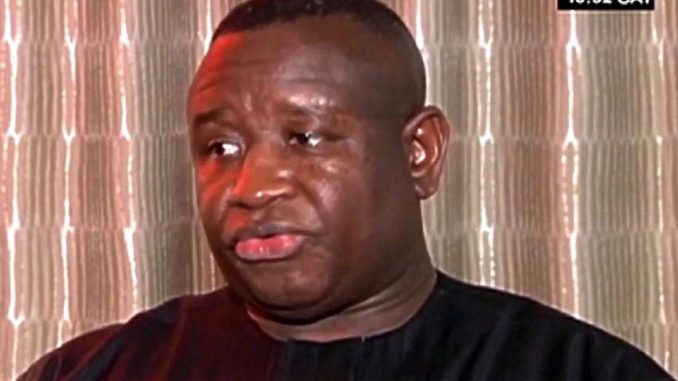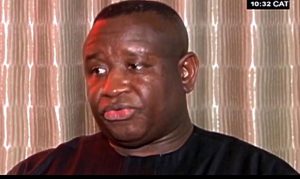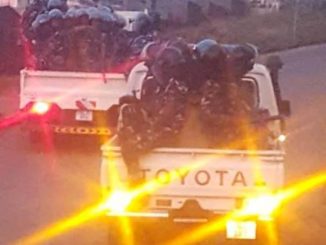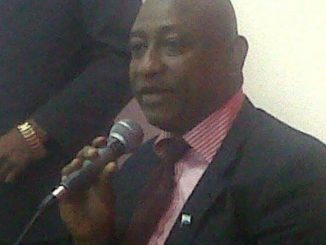
PONDER MY THOUGHTS
BY
Andrew Keili
PRES. BIO & CORONA: A MAN’S GOTTA DO WHAT A MAN’S GOTTA DO
The President has looked and sounded “Presidential” during this period of the CORVID 19 outbreak. His speeches to the nation on announcing the first case and during the lockdown were reassuring and indicated he had a grasp of the salient issues. The government’s actions thus far have been quite timely and may have staved off the onset of CORVID’s arrival in our midst. The quarantining of people from heavily afflicted countries, stopping of flights and closing of borders to our neighbours all seemed to be sound decisions. An interim head has been appointed to head the CORVID team and the information Ministry has held several press conferences to educate a worried public of developments. The initial spate of press releases from every MDA under the sun seems to have stopped.
All of this sounds good. One cannot however fault members of the public for demanding more as this invisible enemy is wreaking havoc in other countries. This is war and fighting it demands a herculean effort on the part of many government functionaries and the cooperation of the public.
The onset of the outbreak and the recent lockdown have unsurprisingly indicated many fault lines in battling this scourge. The outbreak has confirmed the parlous state of our health system, the poor conditions of service of health workers and planning difficulties not only within the health system but with allied MDAs that are supposed to collaborate with the Health Ministry in case of a national emergency of this type. A lot of questions are still being asked on our preparedness for national emergencies. The Sierra Leone Medical and Dental Association has questioned the length of the lockdown and suggested it be extended to 14 days, entreated the government to ensure that PPEs and N95 masks are immediately available, asked for a designated and adequate facility for affected frontline healthcare workers and the provision of all necessary support and compensation for frontline healthcare workers. Their press release noted: “The loss of our colleagues and other healthcare workers during the Ebola epidemic are still fresh in our minds”.
This is a fight like the Ebola one and indeed there are many similarities.
Already we have started witnessing the stigmatisation of those afflicted and often wrongly presumed to be afflicted. This also happened during Ebola. I recall my visit to the Kenema hospital after which I wrote in this column: “It was disconcerting to note that despite the effort of the nurses, even the public did not seem to appreciate them. They were derisively called “Ebola Nurses” when seen in their uniforms in town. It is surprising that despite the sacrifices, incentives promised the nurses were still not forthcoming. Laboratory technicians at Sierra Leone’s only Ebola-testing facility went on strike last week over a $20 monthly risk premium which they were promised but never paid.”
As is usual this days, social media is awash with blatant lies. We have seen some peddled during this outbreak-from “the inimical introduction of the 5G system” to putting off phones at 10.pm to specific accusations of people having being afflicted or people harbouring victims. During the Ebola lockdown, there were people peddling lies that we had been shut down for 72 hours for ”72 percent soap”. One false message that went over social media about the sensitisation teams was: “Make sure you buy your own syringe as they will come to you trying to draw blood for testing. Don’t allow them to use their own syringe”. Well as we saw there were certainly no “Draculas”. Oh-I nearly forgot about the prophetic advice to wash with salt water!
In spite of the similarities, there are also some notable differences between the approach to Ebola and CORVID. During the Ebola crisis Concerned Sierra Leoneans through their various organizations lobbied decision makers abroad for major assistance of various sorts in curbing the crisis as well as delving into projected problems which included air travel, sea freight, economic impacts of business closure and a whole host of other problems wrought by the crisis. Sierra Leonean groups like SLWT lobbied for provision of more isolation centers, deployment of mobile laboratories, facilities to move personnel and equipment, anthropological support for community and social mobilization, amongst other things. Considerable assistance was available from overseas. The US through the CDC, China, World Bank, EU and others gave significant assistance. Indications thus far are that help is certainly forthcoming but perhaps not to the extent we witnessed during the Ebola fight.
Another thing worth noting during the Ebola fight was that several major opposition SLPP members contributed to the Ebola effort. President Bio, then in opposition and abroad came back home and traversed the Southern and Eastern Provinces on an “Ebola sensitisation tour”. There are several explanations for this “magnanimity” on President Koroma’s part which we will save for another day!
Despite the government’s effort at explaining the rationale for the lockdown, the messaging and sensitisation during the Ebola fight were worthy of emulation. It may be an unfair comparison as more funds were available then and more hands were on deck to assist. During the Ebola lockdown there were rave reviews by many on efforts made by the volunteers to educate people about the disease. I wrote at that time “My group turned up on Saturday morning. I was quite impressed with their educational programme on dos and don’ts-very appropriate. Many of my friends have the same view. “
It is good that the President himself has acknowledged the challenges faced during the recent lockdown mainly related to accessing water by communities and transportation of medical workers. Other concerns he did not mention included the desertion of hospitals mainly because of misinformation about government’s motives for the lockdown and many others. The government did try to address some of these problems but they will easily acknowledge the difficulties of ensuring a total lockdown in severely deprived and poverty stricken areas.
The Government has opened accounts for the CORVID funds just like they did during Ebola crisis into which payments from various sources including the government and the private sector can be made. Based on the mistakes in managing the Ebola funds at some stage, whatever we raise as funds to go towards this crisis must be jealously guarded, as charlatans may lurk in the dark to exploit the situation. The government should do all in its power through the various institutions and bodies involved in this crisis to build the confidence needed and prove that this CORVID fight will be fought with diligence ad forthrightness.
Challenges of spewing out false news will continue. Some people have taken this to be a partisan political fight, rather than a national issue and may deliberately want to skew information. This may be true of people of various political persuasions. Whilst some opposition operatives may want the government to look bad, there are also those government supporters who see every little criticism or suggestion as anti-government. Those in the forefront of this fight should be dogged and do what is right-they will find out they will have national support.
The President has asked for continued patience, support, vigilance and adherence to the measures outlined thus far. Each one of us should play his or her part to enhance our collective efforts at containing the spread of the virus.
The President and his team are no doubt aware of the need to minimize the unsavoury socio-economic effects on people during this period. In Ghana the President directed the Minister for Finance to send to Parliament the Coronavirus Alleviation Programme (CAP), whose objective is to protect households and livelihoods, support micro, small, and medium-sized businesses, minimise job losses, and source additional funding for promotion of industries to shore up and expand industrial output for domestic consumption and exports. Government, in collaboration with others will roll out a soft loan scheme up to a total of six hundred million cedis (GH¢600 million), which will have a one-year moratorium and two-year repayment period for micro, small and medium scale businesses. The Government is also actively engaged with local manufacturing companies to assist them in the domestic production of several goods needed for this fight. Ghana has not forgotten about its health workers and has an insurance package, with an assured sum of three hundred and fifty thousand cedis (GH¢350,000) for each health personnel and allied professional at the forefront of the fight together with daily allowances for front line workers.
It would seem we are also on course although we have yet to flesh out details of such a package. The Government certainly intends to cushion the adverse effects of CORVIC 19 with respect to essential commodities and employment right across the economic spectrum. The Bank of Sierra Leone has tabled a Stimulus package of Le500 Billion for the importation of essential goods, and for businesses to access in respect of continuing business and maintain employment. I will not be surprised if the government is contemplating other measures which may be announced soon.
This is a difficult fight with several balancing acts and President Bio has got to lead his team to achieve the government’s objectives for putting paid to this scourge in an already challenging economic environment, heavily divided on the political front. He must heal the divisions and use all the resources he can muster-utilising the material and human resources needed for this fight.
President Bio has embraced the mantle of “wartime president,” during this war. He should heed the advice given to President Trump in an op-ed piece in the Washington Post by noted presidential historian Michael Beschloss – “Level with the public,” unlike James K. Polk, who “fabricated” a pretext for war with Mexico; work “to unite the country against the common enemy,” as FDR did in rallying a divided nation to war against Hitler; show empathy, as Lincoln did for Civil War casualties; build confidence in a victory plan, as Kennedy did during the Cuban missile crisis; warn that more bad news could be on the horizon before it comes, as FDR did after Pearl Harbor; and put trust in wise experts, as Lincoln did with Grant.
President Bio must adopt that trait that can serve crisis managers best: the ability to adapt.
Desperate times call for desperate measures. President Bio must be reminded of John Wayne’s statement: “A man’s gotta do what a man’s gotta do.” But then John Wayne was no “bonga badman”!
Ponder my thoughts.
.




